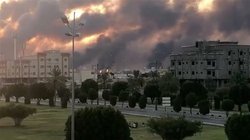 Saudi Arabia has joined a US-led naval mission purportedly aimed at protecting shipping lanes in Middle Eastern waterways as Washington and Riyadh engage in another blame game against Iran following massive Yemeni drone attacks on key Saudi oil facilities.
Saudi Arabia has joined a US-led naval mission purportedly aimed at protecting shipping lanes in Middle Eastern waterways as Washington and Riyadh engage in another blame game against Iran following massive Yemeni drone attacks on key Saudi oil facilities. RNA - Quoting an official source in the Defense Ministry, the state-run Saudi Press Agency (SPA) reported on Wednesday that Riyadh had decided to be a member of the so-called International Maritime Security Construct, which operates in the Strait of Hormuz, Bab el-Mandab, the Sea of Oman and the Persian Gulf.
It also claimed that the US-led coalition is meant to “protect merchant ships through providing safe navigation” and safeguard the interests of the alliance’s member countries.
Saudi Arabia’s accession to the mission, it further claimed, was “in support of regional and international efforts to deter and counter threats to maritime navigation and global trade in order to ensure global energy security and the continued flow of energy supplies to the global economy.”
The United States began trying to persuade its allies into the maritime coalition after it blamed Tehran for two separate attacks on oil tankers in the Gulf of Oman in May and June, without providing any credible evidence to back up the allegation, which Iran has categorically rejected.
The US’s allies have turned a cold shoulder to such an alliance, which they believe could lead to tensions with Iran. Only the UK, Australia and Bahrain have so far joined the coalition.
The Saudi decision came a few days after Yemeni armed forces conducted a large-scale drone operation on Saudi Arabia’s Aramco oil facilities in response to Riyadh’s years-long military aggression, causing a partial halt in crude and gas production from the world’s top oil exporter.
The United States quickly moved to blame Iran for the strikes, though it did not offer any evidence to back up the claim, which both Iran and Yemen have rejected as baseless.
US Secretary of State Mike Pompeo — who is slated to hold talks with Saudi officials later today — became the first White House official to comment on the Yemeni raids, claiming Tehran had “launched an unprecedented attack on the world’s energy supply.”
The State Department said Pompeo will discuss “the recent attack on the kingdom's oil facilities and coordinate efforts to counter Iranian aggression in the region” with Saudi Crown Prince Mohammed bin Salman in Jeddah.
Echoing Washington’s position, Saudi officials have claimed Iranian weapons were used in the attacks, and that the strikes did not originate from Yemen, but declined to provide any detailed evidence.
Saudi Arabia’s ambassador to London also said on Wednesday that Iran was almost certainly behind the attacks on Aramco facilities.
The regime in Riyadh has claimed that it is in possession of evidence which would link Iran to the attack on its oil installations, according to Reuters..
The Saudi Defense Ministry has announced that it will present "material evidence" indicative of Iranian involvement in a news conference later on Wednesday, the news agency reported.
847/940